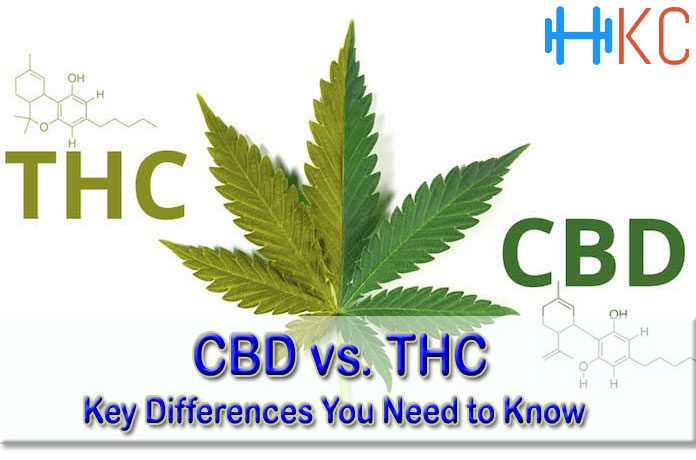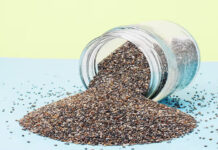From time immemorial, marijuana, extracted from the cannabis plant called Cannabis sativa, has been used both for recreational and medicinal purposes. There are as many as 104 cannabinoids found in cannabis, but two of the most researched ones are THC and CBD.
Both CBD, the short form of cannabidiol, and THC, an acronym for tetrahydrocannabinol, are capable of interacting with the endocannabinoid system (ECS) of the body, producing different natural effects. Incidentally, ECS is a vital signaling system for the body and regulates numerous vital functions, such as appetite, cycles of cellular life and death, immune response, memory, mood, pain, and sleep.
Why both CBD and THC can interact with cannabinoid receptors of ECS is due to their similar chemical make-up with the body’s endocannabinoids. This alters the release of neurotransmitters in the brain. Although seemingly similar, CBD and THC have some distinct differences.
Key differences between CBD and THC
Let’s find out the key differences between CBD and THC:
1. Legal status of THC and CBD in the US
This gains importance since marijuana is a psychotropic drug, whose legality in the US depends upon its concentration and source. However, THC, which finds mention in the US Controlled Substances Act along with marijuana, is prohibited under the federal law.
However, the use of marijuana with a high concentration of THC is permitted in 29 US states and Washington DC for medical purposes, under their cannabis policies. However, its sale requires the recommendation from a licensed physician. What’s more, eight of these states and Washington DC have legalized the use of marijuana for recreational purposes.
As far as CBD is concerned, it is legal in all the 50 US states, but needs to be extracted from imported high-CBD, low-THC hemp. Such CBD is considered a dietary supplement that makes it legal to buy and sell. However, it cannot be legally extracted from marijuana, unless recreational marijuana is permitted in the state or it can be obtained through a state-regulated medical marijuana program.
2. THC is psychoactive, CBD is not
The term psychoactive is used for chemical substances that are capable of changing a person’s mental state when consumed by affecting the working of the brain and the nervous system.
THC is psychoactive, meaning it is the substance in marijuana that causes a euphoric effect or gives a “high”. This is because this cannabinoid directly affects CB1 receptors in the ECS, found in the brain and the central nervous system. This property is what makes marijuana a recreational drug.
CBD, on the other hand, is non-psychoactive and doesn’t bind with CB1 receptors. This means that CBD can never give a “high”, on the contrary, it inhibits CB1-activating properties of THC.
3. THC is more concentrated in marijuana, CBD in hemp
Although both THC and CBD are present in the stalks, flowers, and seeds of both marijuana and hemp, their proportions vary. While THC is found in abundance in marijuana, CBD is more concentrated in hemp.
The reason why marijuana is selectively cultivated, cloned and manipulated is aimed at increasing its THC content that gives a more powerful intoxicating effect. Naturally occurring marijuana contains THC as low as three percent, but a selectively cultivated one can have THC as high as 12 percent.
Hemp, on the other hand, has only 0.3 percent of THC content but is dominated by CBD. This makes it an ideal source of CBD oil.
4. THC and CBD have different atomic arrangement
THC and CBD share the same chemical composition. They have the same molecular formula: C21H30O2 and molecular weights of 314.4 g/mol. However, they differ in their atomic arrangements.
While both CBD and THC are cyclic compounds, that is, their atoms are connected to form a ring, CBD possesses an open ring arrangement with a hydroxyl and alkene group, whereas THC displays a closed ring with an ester group. This slight difference in atomic arrangements makes a big difference as to how the two compounds react with the body’s ECS receptors.
5. THC and CBD interact differently with cannabinoid receptors
When both THC and CBD interact with the body’s ECS and its specialized cannabinoid receptors – CB1 and CB2 – they augment ECS and augment balance. It is the way in which these two cannabinoids interact with these receptors that differ.
While THC displays a higher affinity for CB1 receptors and readily binds with both CB1 and CB2 receptors, CBD not only displays a little affinity with the two receptors but actively suppresses the CB1 and CB2 activating properties of THC. However, CBD does interact with other non-cannabinoid receptors.
6. CBD and THC act differently in relieving pain
Research has shown that both CBD and THC relieve bodily aches and pains. CBD is considered better at handling inflammation and neurotic pain, whereas THC is effective in cramp-related pain and spasticity, a condition in which certain muscles are continuously contracted.
However, THC needs to be taken in small amounts, since higher doses worsen the pain symptoms, as also produce other debilitating side effects. Experts suggest that the best option is to take a combination of THC and CBD to get rid of aches and pains effectively.
7. CBD and THC vary in treating anxiety
Although both CBD and THC have been used in treating anxiety, CBD is found much more effective in this, when used as an anxiolytic drug. THC use, on the other hand, has given mixed results in treating this malady, mainly due to the manifestation of other side effects that higher doses produce.
In addition, CBD has been shown to treat depression, obsessive-compulsive disorders and post-traumatic stress disorder (PTSD). THC, in higher concentrations, is responsible for feelings of paranoia.
8. Varying side effects of THC and CBD
THC, imbibed mainly through the recreational use of marijuana, displays some severe side effects:
- Impaired coordination: THC makes physical action uncoordinated, thereby impairing everyday tasks.
- Diminished memory: THC makes it challenging to recall past events. It also makes it almost impossible to learn new skills, since it reduces the power of mental assimilation.
- Lowered reaction time: THC retards reaction time, making people under the influence at risk behind the wheel, and in handling machinery and tools.
- Palpitation: THC increases the heart rate even under normal circumstances. This may prove risky for those with suffering from heart problems.
- Other bodily symptoms: THC is also known to cause excessive dryness of the mouth and makes the eyes red.
According to the National Cancer Institute, the good part is despite the negative side effects of THC, its overdose is not capable of becoming fatal. However, adolescents using drugs high in THC, over a longer period, can display adverse psychiatric effects. It may also increase their risk of psychiatric disorders, such as schizophrenia.
Nothing of the sort is witnessed in the case of CBD as it is deemed safe and is tolerated well by the body. Studies have found that even chronic use of CBD displayed no adverse clinical, neurological or psychiatric effects. However, minor side effects like dry mouth, light-headedness, and drowsiness have been reported.
Conclusion
CBD offers immense health benefits, as it is found to be effective against common ailments. CBD in oil form is the best way to consume it, since it is without any THC, the intoxicating active ingredient of marijuana.























